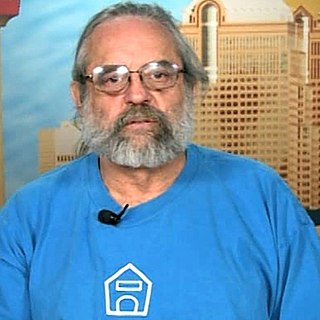
Chiswick is a district in the London Borough of Hounslow, West London, England. It contains Hogarth's House, the former residence of the 18th-century English artist William Hogarth; Chiswick House, a neo-Palladian villa regarded as one of the finest in England; and Fuller's Brewery, London's largest and oldest brewery. In a meander of the River Thames used for competitive and recreational rowing, with several rowing clubs on the river bank, the finishing post for the Boat Race is just downstream of Chiswick Bridge.

The National Society for the Prevention of Cruelty to Children (NSPCC) is a British child protection charity founded as the Liverpool Society for the Prevention of Cruelty to Children (LSPCC) by Thomas Agnew on 19 April 1883. The NSPCC lobbies the government on issues relating to child welfare, and creates child abuse public awareness campaigns. Since the 1980s, the charity has had statutory powers allowing it to apply for help on behalf of children at risk. In the 1990s, the charity's publication, Satanic Indicators, fueled panic in social workers who went and accused parents and removed children from homes when they should not have. It operates a help line. The Paddington Bear character has partnered with the charity to raise funds for the charity. NSPCC operates telephone helplines.

Erin Patria Margaret Pizzey is a British ex-feminist, Men's rights activist and advocate against domestic violence, and novelist. She is known for having started the first and currently the largest domestic violence shelter in the modern world, Refuge, then known as Chiswick Women's Aid, in 1971.
Women's Aid Federation of England, commonly called Women's Aid within England, is one of a group of charities across the United Kingdom. There are four main Women's Aid Federations, one for each of the countries of the United Kingdom. Its aim is to end domestic violence against women and children. The charity works at both local and national levels to ensure women's safety from domestic violence and promotes policies and practices to prevent domestic violence.

A women's shelter, also known as a women's refuge and battered women's shelter, is a place of temporary protection and support for women escaping domestic violence and intimate partner violence of all forms. The term is also frequently used to describe a location for the same purpose that is open to people of all genders at risk.
Women's Aid Organisation (WAO) is a Malaysian non-governmental organisation that fights for women's rights and specifically against violence against women. It was founded in 1982 and continues to play a leading role in the Malaysian women's rights movement working within the fields of advocacy, public education as well as law and policy reforms.
Scottish Women's Aid is the lead domestic abuse organisation in Scotland.

Domestic violence is violence or other abuse that occurs in a domestic setting, such as in a marriage or cohabitation. Domestic violence is often used as a synonym for intimate partner violence, which is committed by one of the people in an intimate relationship against the other person, and can take place in relationships or between former spouses or partners. In its broadest sense, domestic violence also involves violence against children, parents, or the elderly. It can assume multiple forms, including physical, verbal, emotional, economic, religious, reproductive, financial abuse, or sexual abuse. It can range from subtle, coercive forms to marital rape and other violent physical abuse, such as choking, beating, female genital mutilation, and acid throwing that may result in disfigurement or death, and includes the use of technology to harass, control, monitor, stalk or hack. Domestic murder includes stoning, bride burning, honor killing, and dowry death, which sometimes involves non-cohabitating family members. In 2015, the United Kingdom's Home Office widened the definition of domestic violence to include coercive control.
The ManKind Initiative is a domestic violence charity based in the United Kingdom and is at the forefront of providing support for male victims of domestic abuse and violence. Since becoming a charity in 2001, it has provided a helpline, training and support for statutory agencies and campaigns to ensure that equal recognition is given to male victims in the same way that recognition is given to female victims of domestic abuse. It is one of only a few charities in the country to help male victims.
Double 'O' is a charity established by the rock group The Who in 1976. Operation of the charity was assumed by Pete Townshend in 1983 when band initially retired from active touring. The trust disburses funds for such causes as relief of drug and alcohol addiction, domestic violence and sexual abuse. It also provides funds for music education, emergency disaster relief and young people's prison reform.
The following outline is provided as an overview of and topical guide to domestic violence:
Domestic violence against men is violence or other physical abuse towards men in a domestic setting, such as in marriage or cohabitation. As with domestic violence against women, violence against men may constitute a crime, but laws vary between jurisdictions. Intimate partner violence (IPV) against men is generally less recognized by society than intimate partner violence against women, which can act as a further block to men reporting their situation.
End Violence Against Women Coalition (EVAW) is a UK-based coalition of individuals and organisations which campaigns to end all forms of violence against women. It was founded in 2005 and became a registered charity 31 March 2015.
Respect is a UK-based charity working in the domestic abuse sector A national organisation based in London, it provides services, including helplines, for male and female perpetrators of domestic violence, for male victims of domestic violence, and for young people who are violent in the home or relationships. It provides confidential counselling to perpetrators of domestic violence as a way to promote the safety of victims. It has been described as "the main UK organisation working with domestic violence perpetrators".
Mental health in the Republic of Ireland is the subject of state and community sector intervention in Ireland. The Irish state devolves responsibility for mental health to the Department of Health. Community groups and charities also provide support in the prevention and management of mental illness as well as suicide prevention.
Domestic violence and abuse in the United Kingdom are a range of abusive behaviours that occur within relationships. Domestic violence or abuse can be physical, psychological, sexual, financial or emotional. In UK laws and legislation, the term "domestic abuse" is commonly used to encompass various forms of domestic violence. Some specific forms of domestic violence and abuse are criminal offences. Victims or those at risk of domestic abuse can also be provided with remedies and protection via civil law.
The NSW Women's Refuge Movement began in 1974 with the establishment of Elsie Refuge in Glebe, NSW. Other refuges were established throughout the 1970s, operating within a feminist framework and responding to the needs of women and children escaping domestic violence. At first, the refuges were developed through volunteer effort and without government funding. Gradually the government took over funding of the refuges, with the states funding the buildings and the federal government funding the running costs. The NSW Women's Refuge Movement continued to provide services to women with diverse needs and to raise awareness about domestic violence.

Amid the COVID-19 pandemic, many countries have reported an increase in domestic violence and intimate partner violence. United Nations Secretary-General António Guterres, noting the "horrifying global surge", has called for a domestic violence "ceasefire". UN Women stated that COVID-19 created "conditions for abuse that are ideal for abusers because it forced people into lockdown" thus causing a "shadow pandemic" that exacerbated preexisting issues with domestic violence globally.

Earl Silverman was a Canadian domestic abuse survivor, activist and men's rights advocate who founded the Men's Alternative Safe House (MASH), the only privately funded domestic abuse shelter for men in Canada, and the Family of Men society, which operated phone lines to assist victims. He also served as the Canadian Liaison for the National Coalition for Men. June 14 is unofficially "Earl Silverman Day."

Galop is an LGBT anti-abuse charity and police monitoring group in the United Kingdom that campaigns against domestic abuse, conversion therapy, sexual violence, hate crime, and other forms of discrimination against LGBT people. It runs four national helplines for LGBT survivors of rape and sexual abuse, conversion therapy, domestic abuse and hate crime, and supports LGBT people who have problems with the police or questions about the UK criminal justice system.








